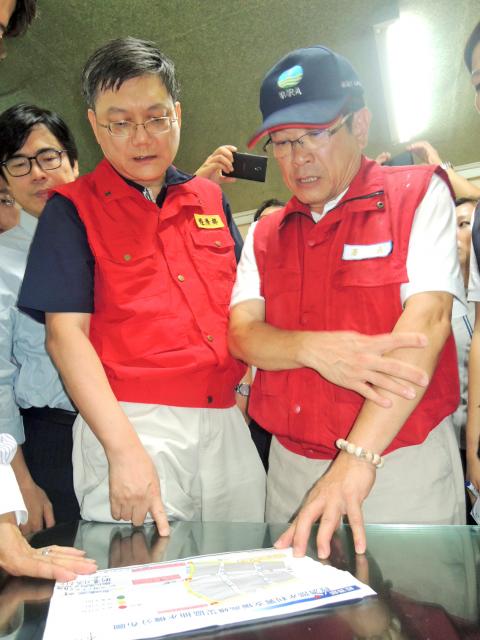Premier Jiang Yi-huah (江宜樺) yesterday accepted Minister of Economic Affairs Chang Chia-juch’s (張家祝) resignation after repeated efforts to dissuade Chang from quitting.
Jiang has appointed Deputy Minister of Economic Affairs Woody Duh (杜紫軍), who had also offered to resign, to replace Chang.
Chang is the highest-ranking official to have quit in the wake of a series of gas pipeline explosions in Greater Kaohsiung on July 31 and Aug. 1 that killed 30 people and injured 310. The explosions are believed to have been caused by a leaking underground pipe carrying propene.

Photo: Hung Ting-hung, Taipei Times
President Ma Ying-jeou (馬英九) expressed regret over Chang’s resignation, but said he respected the decision.
Ma also acknowledged Chang’s contribution to the government’s achievements, such as its economic cooperation agreements with Singapore and New Zealand and a service trade pact with China, Presidential Office spokeswoman Ma Wei-kuo (馬瑋國) said.
Chang, 64, tendered his resignation last week amid finger-pointing over the pipeline blasts.
Critics have blamed the Ministry of Economic Affairs (MOEA), saying its oversight of petrochemical companies has been poor.
In a public statement issued on Thursday, Chang expressed frustration over the legislative process, which he said has been hampered by the opposition’s efforts to block important economic projects. This puts the nation’s future in jeopardy, Chang said.
Since becoming economics minister in February last year, Chang took on a number of thorny issues, including massive public opposition to government efforts to complete the Fourth Nuclear Power Plant and to a service trade agreement with China.
The government eventually bent under the pressure of huge public protests against the agreement in March and April, putting the pact on hold, and has shelved the nearly completed plant in New Taipei City’s Gongliao District (貢寮).
Commenting on Duh’s appointment, National Taiwan University economics professor Kenneth Lin (林向愷) had reservations about the new arrangement.
“I do not think the appointment will help improve the economy and save lives,” Lin said. “The core problem is that the government has totally lost its direction. It cannot come up with effective policies, or measures that can help solve the serious problems faced by the people and industries.”
Those problems include stagnant wages, slow industrial improvements, the migration of advanced technologies and a widening wealth gap, Lin said.
Taiwan Institute of Economic Research (台灣經濟研究院) director Gordon Sun (孫明德) said he has no doubt that Duh is a well-trained professional and will have no problem instituting the government’s existing polices, judging from his long experience at the ministry.
However, Sun said Duh’s top priority now should be improving the ministry’s communication with lawmakers and the public if the ministry wants to push through its industrial polices.
The ministry’s key policies, such as striking a service trade deal with China, have met strong resistance from opposition lawmakers and the general public primarily because of poor communication, Sun said.
Additional reporting by Lisa Wang

A magnitude 7.0 earthquake struck off Yilan at 11:05pm yesterday, the Central Weather Administration (CWA) said. The epicenter was located at sea, about 32.3km east of Yilan County Hall, at a depth of 72.8km, CWA data showed There were no immediate reports of damage. The intensity of the quake, which gauges the actual effect of a seismic event, measured 4 in Yilan County area on Taiwan’s seven-tier intensity scale, the data showed. It measured 4 in other parts of eastern, northern and central Taiwan as well as Tainan, and 3 in Kaohsiung and Pingtung County, and 2 in Lienchiang and Penghu counties and 1

FOREIGN INTERFERENCE: Beijing would likely intensify public opinion warfare in next year’s local elections to prevent Lai from getting re-elected, the ‘Yomiuri Shimbun’ said Internal documents from a Chinese artificial intelligence (AI) company indicated that China has been using the technology to intervene in foreign elections, including propaganda targeting Taiwan’s local elections next year and presidential elections in 2028, a Japanese newspaper reported yesterday. The Institute of National Security of Vanderbilt University obtained nearly 400 pages of documents from GoLaxy, a company with ties to the Chinese government, and found evidence that it had apparently deployed sophisticated, AI-driven propaganda campaigns in Hong Kong and Taiwan to shape public opinion, the Yomiuri Shimbun reported. GoLaxy provides insights, situation analysis and public opinion-shaping technology by conducting network surveillance

‘POLITICAL GAME’: DPP lawmakers said the motion would not meet the legislative threshold needed, and accused the KMT and the TPP of trivializing the Constitution The Legislative Yuan yesterday approved a motion to initiate impeachment proceedings against President William Lai (賴清德), saying he had undermined Taiwan’s constitutional order and democracy. The motion was approved 61-50 by lawmakers from the main opposition Chinese Nationalist Party (KMT) and the smaller Taiwan People’s Party (TPP), who together hold a legislative majority. Under the motion, a roll call vote for impeachment would be held on May 19 next year, after various hearings are held and Lai is given the chance to defend himself. The move came after Lai on Monday last week did not promulgate an amendment passed by the legislature that

AFTERMATH: The Taipei City Government said it received 39 minor incident reports including gas leaks, water leaks and outages, and a damaged traffic signal A magnitude 7.0 earthquake struck off Taiwan’s northeastern coast late on Saturday, producing only two major aftershocks as of yesterday noon, the Central Weather Administration (CWA) said. The limited aftershocks contrast with last year’s major earthquake in Hualien County, as Saturday’s earthquake occurred at a greater depth in a subduction zone. Saturday’s earthquake struck at 11:05pm, with its hypocenter about 32.3km east of Yilan County Hall, at a depth of 72.8km. Shaking was felt in 17 administrative regions north of Tainan and in eastern Taiwan, reaching intensity level 4 on Taiwan’s seven-tier seismic scale, the CWA said. In Hualien, the